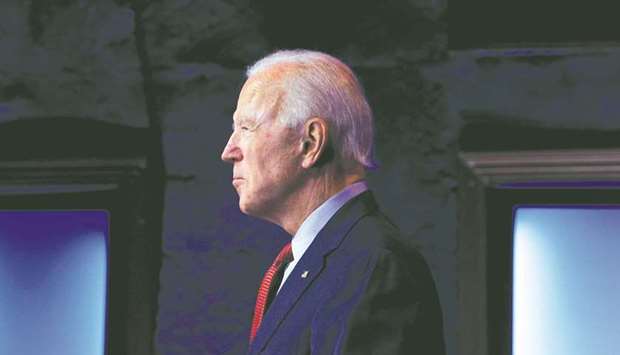On January 6, when a mob of US President Donald Trump’s supporters breached the Capitol with shocking ease, the world’s already-low expectations of the United States plummeted. And yet, when it comes to the global economy, there are immediate steps President-elect Joe Biden can take to boost the world’s – and especially developing economies’ – prospects.
To be sure, the limits of US global leadership are significant. After Trump’s presidency, even America’s closest allies harbour serious doubts about its reliability and values, and about the effectiveness of its government. The Trump administration’s botched Covid-19 response, including an inept vaccine rollout, reinforced the perception of national derangement. The Capitol insurrection – which Trump incited, with the goal of disrupting Congress’s certification of Biden’s electoral victory – drove it home.
Even on the economic front, the US is nowhere near as dominant as it was a decade ago, let alone a generation ago. Add to that a razor-thin Democratic majority in the US Senate, and the Biden administration’s ability to implement economic policies that reverberate positively worldwide would seem to be limited.
It is not. Biden does not need congressional approval to implement measures that would have far-reaching benefits for Americans and the rest of the world.
The first is to drop all objections to a World Trade Organisation proposal to waive temporarily certain intellectual-property obligations in response to Covid-19. The proposal – introduced by India and South Africa, and cosponsored by other developing countries – aims to remove barriers to timely access to affordable medical products related to the “prevention, containment, or treatment” of Covid-19.
This is in line with WTO rules: the Trade-Related Aspects of Intellectual-Property Rights (TRIPS) agreement allows for compulsory licensing. Moreover, the WTO specifies public-health emergencies as adequate cause under TRIPS to issue compulsory licenses that would allow more companies to produce essential drugs. It is difficult to imagine a more appropriate situation in which to apply this provision.
A lower price for Covid-19 vaccines and drugs would benefit everyone, including the advanced economies, whose public budgets are under significant strain. And yet the US has led the advanced economies in blocking the proposal. This benefits only one group: multinational pharmaceutical companies.
This isn’t a matter of ensuring that these companies recoup their costs. The Covid-19 vaccines have been developed on the back of public research and were funded almost completely by public budgets. Even with the temporary suspension of intellectual-property rights, the companies that developed them will profit handsomely.
Allowing these companies to retain patent monopolies on Covid-19 vaccines would prolong the pandemic for everyone – adversely affecting public health and the economy – for the sake of letting a few huge companies line their pockets. If, however, the Biden administration leads the advanced economies in supporting the temporary suspension, countless lives would be saved, and the global economic recovery would accelerate.
Likewise, the Biden administration does not need congressional approval to allow the International Monetary Fund to provide a new allocation of Special Drawing Rights to all its member countries. The US blocked the IMF’s request for such an allocation – worth $500 billion – last April. (India also blocked the request, but if the US withdraws its objection, India is unlikely to resist. In any case, India has little voting power.)
At this point, however, a $500 billion allocation is nowhere near enough; a $2 trillion allocation would be far more effective in bolstering the ailing global economy. Nonetheless, even an initial $500 billion worth of SDRs would provide short-term relief to a wide range of developing economies, especially those with heavy debt burdens.
A third priority for the Biden administration should be to co-operate with other countries to create an effective global system for taxing multinationals’ profits. As the Independent Commission for the Reform of International Corporate Taxation has shown, this would not be difficult to do. The first step would be to set a minimum effective corporate tax rate of 25% worldwide.
The share of a company’s profits taxed in a particular country would be determined according to a formula that included sales, employment, users (for digital companies), and capital. That way, multinationals could no longer avoid taxes by artificially shifting reported profits to lower-tax jurisdictions.
The Trump administration vehemently opposed action to tax multinationals fairly. For example, when France decided to tax the revenue of US digital giants like Facebook, Apple, and Google, it imposed retaliatory tariffs, claiming that the tax discriminated against US companies. The Biden administration should take the opposite approach, working with other countries to ensure a victory for governments and people worldwide.
Biden has already vowed that, on his first day in office, his administration will take the final step that can immediately boost the global economy: rejoining the Paris climate agreement. By doing so, the US will commit not only to meet specific targets for reducing greenhouse-gas emissions, but also to provide financial assistance to vulnerable developing countries.
While the Paris agreement has its limitations, it is currently our best hope for decarbonising the world economy. And America’s influence is essential to make it work. In fact, after Trump announced in 2017 that he was withdrawing the US from the accord – claiming that it placed an “unfair economic burden” on American workers, businesses, and taxpayers – some other countries reduced their commitments.
More recently, however, major economies, from China to the European Union, have made ambitious new pledges. Even US businesses have begun to recognise that investing in a green transition is in their own interest.
By recommitting to the Paris agreement, Biden will accelerate global progress on climate change and provide additional support to post-pandemic economic recovery. We can hope that his administration will quickly pluck the other low-hanging fruit as well.

GLAD TIDINGS: By recommitting to the Paris agreement, President Joe Biden will accelerate global progress on climate change and provide additional support to post-pandemic economic recovery.
